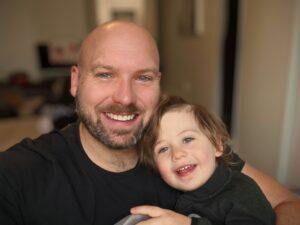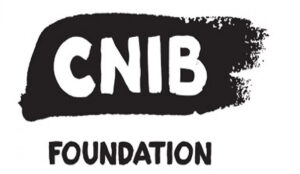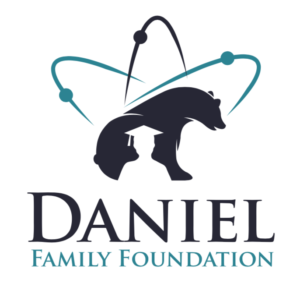
My life changed forever when I was diagnosed with Usher Syndrome, a rare, genetic deafblind condition that includes lifelong hearing loss and the progressive onset of retinitis pigmentosa, a blinding disease for which there is no cure.
I will never forget arriving home with the news of my diagnosis and how I lingered outside my front door, how afraid I was to tell my wife and infant son.
There were nights when I woke to a dark bedroom seized with panic until the lights were turned on and stayed on until the sun rose. I looked at my boy and worried for his future. I thought about the burden all this will place on my wife and our family. And I worried, selfishly, about what it meant for me, the sensory experience of a world taken for granted and now eroding, mote by mote, before my eyes.
When I was eight years old, I told my parents that I wanted to play hockey. The only thing I remember about that first year is that I never left the ice, because I was having too much fun. (I also couldn’t hear the coaches hollering at me to get off.)
Every year my dad built us a backyard rink. It was the best rink in our town, with boards, lights, the works. My favourite memory is of skating alone at night under the lights, listening to the sound of one pair of skates carving up the ice.
Losing my sight has changed how I understand my responsibilities as a person, father and husband. Rather than be defined by the condition, I had to figure out how to excel within it. What kind of man do I want to be? What kind of example can I set for my son and for others?
I thought about my father out late on that rink every night, no matter how cold, in galoshes and toque, hose in one hand, a cigar hanging from his mouth. In him, I saw what it was to make a promise and a sacrifice, to be committed. “You have to put in the work,” he’d tell me, “But you also have to remember that it’s supposed to be fun.”
My years in hockey have taught me more than I ever thought they could, and discovering the sport of blind hockey has reminded me of what matters most, when I most needed the reminder.
I want every child and adult with sight loss to know that the game belongs to them too — that they have the same opportunities to discover the values, gratitude and courage that help all of us lead rich and rewarding lives, no matter how much or how little we see.
I am skating because that’s a promise I will keep.
TO SUPPORT MATT’S #COURAGE21 FUNDRAISER CLICK HERE.
Ma vie a changé pour toujours quand on m’a diagnostiqué le syndrome d’Usher, une maladie génétique rare de surdicécité qui comprend une perte auditive permanente et l’apparition progressive de la rétinite pigmentaire, une maladie cécitante pour laquelle il n’y a pas de remède.
Je n’oublierai jamais mon retour à la maison avec la nouvelle de mon diagnostic et la façon dont je me suis attardé devant ma porte d’entrée, à quel point j’avais peur de le dire à ma femme et à mon fils en bas âge.
Il y avait des nuits où je me réveillais dans une chambre sombre, prise de panique jusqu’à ce que les lumières soient allumées et restées allumées jusqu’à ce que le soleil se lève. J’ai regardé mon garçon et je me suis inquiété pour son avenir. J’ai pensé au fardeau que tout cela imposerait à ma femme et à notre famille. Et je m’inquiétais, égoïstement, de ce que cela signifiait pour moi, l’expérience sensorielle d’un monde tenu pour acquis et maintenant en train de s’éroder, grain par grain, sous mes yeux.
Quand j’avais huit ans, j’ai dit à mes parents que je voulais jouer au hockey. La seule chose dont je me souviens de cette première année, c’est que je n’ai jamais quitté la patinoire, parce que je m’amusais trop. (Je ne pouvais pas non plus entendre les entraîneurs me crier de sortir.)
Chaque année, mon père nous a construit une patinoire. C’était la meilleure patinoire de notre ville, avec des bandes, des lumières, et tout ce qu’il faut. Mon souvenir préféré est celui de patiner seul la nuit sous les lumières, en écoutant le son d’une paire de patins creusant la glace.
La perte de la vue a changé ma
perception de mes responsabilités en tant que personne, père et mari. Plutôt que d’être défini par la condition, je devais trouver comment y exceller. Quel genre d’homme est-ce que je veux être? Quel genre d’exemple puis-je donner à mon fils et aux autres?
Je pensais à mon père qui sortait tard sur cette patinoire tous les soirs, peu importe qu’il fasse froid, en galoches et en tuque, un tuyau à la main, un cigare qui lui pendait à la bouche. En lui, j’ai vu ce que c’était que de faire une promesse et un sacrifice, d’être commis. « Il faut travailler, me disait-il, mais il faut aussi se rappeler que c’est censé être amusant.
Mes années de hockey m’ont appris plus que je ne le pensais, et la découverte du hockey pour aveugles m’a rappelé ce qui compte le plus, quand j’avais le plus besoin de rappel.
Je veux que chaque enfant et adulte ayant une perte de vue sache que le jeu leur appartient aussi – qu’ils ont les mêmes opportunités de découvrir les valeurs, la gratitude et le courage qui nous aident tous à mener une vie riche et enrichissante, peu importe combien ou comment on voit.
Je patine parce que c’est une promesse que je peux tenir.









